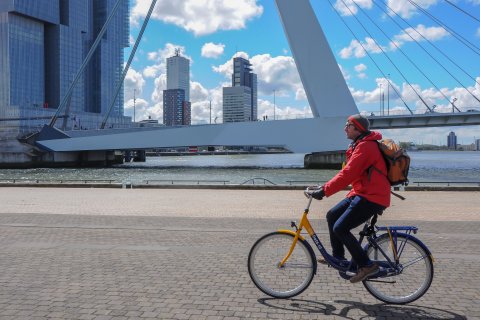Everybody bikes, don’t they?!
‘What can experiences of living in the Netherlands tell us about how we can make cycling in Canadian cities better?’ That is the main question urban geographer and alumnus of Utrecht University Brian Doucet seeks to answer with his current Everybody Bikes Research Project.

Originally from Toronto, Brian Doucet lived, studied and worked in the Netherlands between 2004 and 2017 and obtained his MSc in Human Geography and Planning and his PhD in Urban Geography from Utrecht University. Fun fact: with his curling team at the time, he won three Dutch championships. ‘It was a formative time of my life. It was great to be able to have time to mature and grow, intellectually and as a person, in a city like Utrecht. The first research projects you design yourself, are crucial’, Brian explained. ‘The origin of a lot of the ideas I do research on now, stem from my time at Utrecht.’ Brian also taught at University College Utrecht and in the Geography department of Utrecht University for six years. ‘There was a lot of curiosity among the students that I taught at the time. Some I’m still connected to in one way or another. They are now established in their careers themselves.’
It was great to be able to have time to mature and grow, intellectually and as a person, in a city like Utrecht.
How cycling became his topic
It’s not that he had never been on a bike before his time in the Netherlands, but the perception of cycling in the two countries is completely different. When Brian moved to the Netherlands in 2004, the first thing he got himself was a bike. ‘Living in the Netherlands, I just used the bike all the time. It was the most convenient way of getting around. We had more bikes in our household than people: regular city bikes, a “bakfiets” [cargo bike], a little “loopfiets” [push bike] for my daughter, my racing bike, … When I moved back to Canada in 2017, the first thing I bought was a car.’ That sums it up pretty much. ‘Even though I was in an urban geography department in Utrecht, I had never thought of cycling from an academic perspective. Returning to Canada, I sort of had the role of a cycling advocate thrown at me. Because of my experiences living in the Netherlands, people here wanted to know my thoughts on cycling. I started getting involved in cycling debates, sat on a committee with the local municipality. I’ve been drawn into the subject.’ Recently, Brian applied to Canada’s national research funding agency and got granted a so-called “Insight development grant”, meant for established researchers who want to launch new strands of research. ‘While the Everybody Bikes research study is very much a personal one that originates from my own experiences living in both countries, we have a fantastic team of cycling and mobility experts from both sides of the Atlantic involved in the project. Included in this team is Dea van Lierop from Utrecht University’s Department of Human Geography and Planning.’
Some of the ways to make cycling inclusive are less about the bike lane but more about how we experience public space.
It goes beyond bike lanes
Academically, Brian has been interested in the lived experiences of urban change, gentrification and displacement for quite some time. In all his research, he seeks to include the perspectives of people who are rarely central to mainstream debates about cities. ‘There is a lot of great cycling advocacy here in Canada. But there are also many people who aren’t able to join a committee or speak at a city council. It is essential that their perspectives are also part of these debates.’ As a Canada Research Chair my task is to use academic knowledge to shift the four Ps: planning, policy, political and public debates. Cycling is one of the most hotly-discussed topics in Canadian cities today. With the bike study we hope to learn from other places. If we understand about culture, contact and lifestyle from the perspective of people who’ve lived in both the Netherlands and Canada we can learn what we can use, copy and adapt for our own purposes here.

There’s a big difference between visiting a place for a few days and living in a different country. ‘Living in the Netherlands for thirteen years, it was clear to me that while bike lanes played a big role in making cycling easy and accessible, there is much more involved in making the Netherlands the best place in the world for cycling.’ Some of the ways to make cycling inclusive are less about the bike lanes as such, but more about how we experience the public space. Infrastructure, lanes, laws, road rules, cycling being an accepted way of getting around, the more egalitarian nature of Dutch society - those aspects are all intertwined. ‘Cycling in itself is very egalitarian – it is a cheap, easy mode of transport. But how do we enable everybody to make use of it? I am confident this study is going to yield some clues to make cycling really equitable for everyone in Canada.’
Do you want to contribute to the Everybody Bikes Research Study?
Brian Doucet and his colleague Rebecca Mayers are especially looking for Dutch people living in Canada and Dutch people who have returned from living in Canada. It is not required that you cycled regularly in both countries. For more information and/or to participate, please take a look at Everybody Bikes Research Project.

